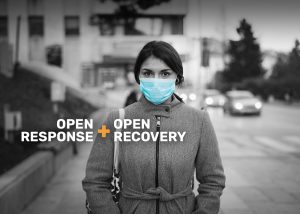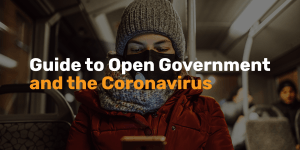Tackling the Crisis of Citizen Trust in Governance: The World Bank Imperative
Keynote remarks delivered by Sanjay Pradhan, CEO, The Open Government PartnershipThe Open Government Partnership (OGP) is a multi-stakeholder initiative focused on improving government transparency, ensuring opportunities for citizen participation in public matters, and strengthen... More at the World Bank Governance Forum on March 17, 2021
This session on “Citizens and Trust in Institutions” at the Governance Forum is vital – for citizens in developing countries, for the World Bank and for the governance practice.
And that is because we face a crisis of citizen trust in governance today.
- Prior to the pandemic, citizen trust in governments had already plummeted to an all-time low, according to the Edelman Barometer. In far too many countries, citizens had been perceiving their governments to be disconnected and unresponsive to their needs, or corrupt and captured by special interests.
- In May 2020, there was a brief jump in trust in government, when people entrusted the government with leading the fight against Covid-19 and leading economic recovery.
- But many governments failed the test and squandered that trust bubble, and people’s trust in government fell sharply during COVID-19, more than across all other stakeholder groups.
- This fall in trust also impacts International Financial Institutions like the World Bank which support governments.
This crisis of citizen trust has serious consequences.
- Trust is the foundation upon which the legitimacy of public institutions is built and is necessary for compliance with regulations and the taxPlacing transparency, accountability, and participation at the center of tax policy can ensure that burdens are distributed equitably across society. Technical specifications: Commitments related to c... system, and for the confidence of investors and consumers.
- During the COVID-19 pandemic, trust in public institutions has been vital in enabling governments to respond rapidly and secure citizen support for COVID-19 containment, mitigation and recovery.
So if trust is so vital, how to build citizen trust?
- Excellent work done by the OECD underscores two key drivers of trust: competence and values.
- First trust in competence is built when governments deliver services that respond to citizens’ needs.
- Second, trust in values is built when governments demonstrate integrity, openness and the exercise of power in the public interest.
Open government approaches can help enhance both values and competence in governance. That is because open government is a partnership between government and citizens which builds trust. Specifically, open government approaches uniquely combine two complementary aspects: first, transparencyAccording to OGP’s Articles of Governance, transparency occurs when “government-held information (including on activities and decisions) is open, comprehensive, timely, freely available to the pub... More, openness and responsiveness by government on the supply side of governance, and second, participation, monitoring and feedback from citizens and other stakeholder groups on the demand-side. Together this builds responsive governance, and also value-based governance anchored in openness, inclusionOGP participating governments are working to create governments that truly serve all people. Commitments in this area may address persons with disabilities, women and girls, lesbian, gay, bisexual, tr... More and oversight.
So let me share practical examples of concrete reforms that government and civil society are advancing to build trust in these two ways. These examples are drawn from across 78 member countries of the Open Government Partnership or OGP, of which 50 are World Bank Group borrowers.
To advance the first driver of trust through value-based governance, a key frontier of reforms in OGP countries is open budgets and open contracts to build confidence that public money is used for the purposes intended.
Take open budgets:
- This is vital during COVID-19 because governments have mobilized, including from the World Bank and IMF, a staggering $12 trillion in COVID-19 stimulus and safety nets. Millions of lives and livelihoods are at stake. These packages seek to provide life-saving vaccinations for the entire population; safety nets for millions of vulnerable people; credits to protect millions of jobs. But when so much money moves so fast, there is a high risk of corruption, as we are seeing in Covid-19 corruption scandals across countries. Open budgets can build trust that money is used for the intended purposes.
- To this end, governments need to ensure that budget decision-making is open, participatory and inclusive. Governments must also openly disclose budgetary expenditures, including COVID-19 spending. But it is not sufficient to stop at fiscal transparency; governments need to empower citizens on the demand-side to follow the money to ensure it reaches the intended beneficiaries. For instance, Paraguay’s mapa inversiones and South Africa’s Vulekamali platforms publish COVID-19 budgets, and engage citizens, including marginalized groups, for feedback and oversight.
- A particularly important imperative is to engage and empower citizen groups on the demand-side. In Africa, the Follow the Money network of civil society organizations is tracking COVID-19 spending, including aidMore and better information about aid helps partner countries and donor institutions plan and manage aid resources more effectively, parliaments and civil society to hold governments accountable for t... flows, to ensure it is reaching the beneficiaries, including by leveraging social media and digital technology for citizen feedback.
- In Nigeria, the State Minister of Finance – who is also responsible for OGP – convened a multi-stakeholder roundtable in June 2020 including government agencies on the supply side of governance alongside demand-side actors – civil society, the private sectorGovernments are working to open private sector practices as well — including through beneficial ownership transparency, open contracting, and regulating environmental standards. Technical specificat... More, the Auditor General – and donors like the World Bank to agree on mutual roles and complementary actions to monitor COVID-19 funds. This resulted in concrete actions in its OGP action planAction plans are at the core of a government’s participation in OGP. They are the product of a co-creation process in which government and civil society jointly develop commitments to open governmen... including: publishing all COVID-19 expenditures on the Open Treasury Portal, publishing auditsInstitutional and legal frameworks are necessary for providing assurance of the integrity of financial information and of compliance with budgetary rules and procedure. Technical specifications: These... of all COVID-19 spending, and publishing beneficial ownershipDisclosing beneficial owners — those who ultimately control or profit from a business — is essential for combating corruption, stemming illicit financial flows, and fighting tax evasion. Technical... More of companies involved in COVID-19 procurement. These will empower citizens and citizen groups to follow the money to their intended purposes.
Open contracts and open company ownership are needed to combat corruption and build citizen trust that power is exercised in the public interest. In Ukraine, to tackle capture of public procurementTransparency in the procurement process can help combat corruption and waste that plagues a significant portion of public procurement budgets globally. Technical specifications: Commitments that aim t... More, including by oligarchs, reformers leveraged OGP to build an online platform – ProZorro – wherein all contracts are disclosed in open dataBy opening up data and making it sharable and reusable, governments can enable informed debate, better decision making, and the development of innovative new services. Technical specifications: Polici... standards so citizens can search them, and then a second platform – DoZorro – to empower demand-side monitoring wherein citizens can report violations in contract award and implementation. In two years, citizens reported 14,000 violations with over half publicly resolved, the government saved $1 billion, 82 percent of entrepreneurs reported reduced corruption, and there was a 50 percent increase in businesses, including SMEs, bidding for contracts for the first time. Galvanized by such results, more than 70 OGP governments have committed to open contractingA transparent procurement process, known as open contracting, increases competition, improves public service delivery, and ensures governments better value for their money. Technical specifications: C... More.
In the context of COVID-19, open contracts can literally save lives. When New York desperately struggled to acquire ventilators, it paid — through an opaque contract — a whopping $69 million for 1,500 ventilators at triple the retail price. Tragically, none were even delivered. By contrast, in Paraguay and Colombia, the government publishes emergency contracts as open data which civil society monitors on the demand-side, including by tracking price differences for COVID-19 supplies. We similarly need transparency and public oversight in COVID-19 vaccine contracts between governments and pharmaceuticals and in vaccine distribution to combat corruption and ensure access by underserved communities and the poor.
This takes us to the second driver of trust through responsive governance where a key frontier of reforms in OGP countries is empowering citizens to shape and oversee policies and services that impact their lives.
One important priority here is to integrate citizen participationAccording to OGP’s Articles of Governance, citizen participation occurs when “governments seek to mobilize citizens to engage in public debate, provide input, and make contributions that lead to m... More in policymaking. For instance, participatory budgeting allows citizens to set priorities and fund projects that respond to their needs. All of this is particularly conducive at the subnational level, where governments are closer to the people. An interesting example emerged when I was Vice President of the World Bank Institute. In South Kivu Province in the Democratic Republic of Congo, citizen trust was very low emerging from conflict. To build trust the government introduced participatory budgeting, enabling citizens to vote on budget allocations. When citizens saw roads and schools being repaired that they voted for, tax collection jumped 16-fold, a clear measure of the increased trust in government resulting from open, participatory approaches.
We need similar citizen feedback and government responsiveness in downstream service delivery. In Kaduna, Nigeria, when an audit revealed that a health clinic promised to citizens and paid by the budget only existed on paper, the Director of Budget disclosed the geo-location of publicly funded projects on a mobile app. But then the demand-side kicked in as citizens were empowered to upload photos and feedback on this mobile app – feedback which goes directly to the Governor’s office and State Legislature for corrective action. Kaduna reports record completionImplementers must follow through on their commitments for them to achieve impact. For each commitment, OGP’s Independent Reporting Mechanism (IRM) evaluates the degree to which the activities outlin... More of 450 schools, 250 health clinics in two years and 20 percent reduction in maternal mortality from the use of these clinics.
So in closing, to build citizen trust, the World Bank needs to support such transformative open government reforms. This includes support for open budgets, open contracts and open company ownership through DPLs and governance projects. But it also needs to support open government and citizen feedback inside sectoral operations of health, educationAccountability within the public education system is key to improving outcomes and attainment, and accountability is nearly impossible without transparent policies and opportunities for participation ..., infrastructure.
Across all this, it is important for the Bank to not only work with governments and support supply-side transparency of government, but also support demand-side citizen participation and feedback.
This then raises the challenge and imperative of how should the Bank support citizen participation and feedback – either direct citizen feedback through technology or through civil society. The WBG provides financing and support for governments and the private sector. But that leaves out the third leg of the “societal stool” – the citizen sector, including civil society. The Global Partnership for Social AccountabilityTransparency of public service delivery is not enough on its own; giving citizens opportunities to monitor progress on the ground and hold their governments accountable improves the quality of these s... (GPSA) was the WBG’s grant instrument to build the capacity of CSOs, but unfortunately it has stayed a small instrument. And there wasn’t a systematic link with WBG operations to respond to citizen feedback.
OGP has baked in this demand and supply side in a collaborative platform, with government and civil society co-creating concrete commitments in OGP action plans. The IDA-18 targets for supporting one-third of IDA countries in implementing OGP commitments was an important step, but it did not take hold and there were no instruments to support the demand-side. Admittedly the Bank may not be best placed to build capacity of demand-side actors, but it can partner systematically with bilateral donors and foundations at the country level who can support capacity buildingEnhancing the skills, abilities, and processes of public servants, civil society, and citizens is essential to achieving long-lasting results in opening government. Technical specifications: Set of ac... of civil society in platforms like OGP. And with that explicit link, World Bank operations can then systematically support the government response to that citizen feedback. Closing this feedback loop is vital for building trust.
In sum, the Bank needs to advance new approaches in open government and citizen empowerment to win back citizen trust which is of profound significance for citizens, for governance, and for the fundamental mission of the Bank.
No comments yet
Related Content

Open Response + Open Recovery
Our community’s fundamental values of accountability, transparency, inclusivity, and responsiveness are vital as we move through COVID-19 response to recovery. Find resources, events and examples from OGP and partners.

A Guide to Open Government and the Coronavirus
This guide is a one-stop shop for the best current resources on how open government projects and approaches can support tackling the pandemic.
 Challenges and Solutions
Challenges and Solutions Open Response, Open Recovery
OGP CEO Sanjay Pradhan writes about how the COVID-19 pandemic has compelled governments and citizens alike to take unprecedented, mitigating actions. In their shared struggle, mutual trust between government and…


Leave a Reply